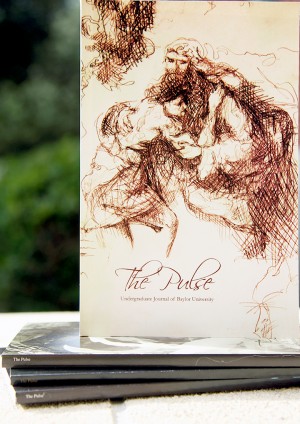
Travis Taylor | Lariat Photo Editor
By Ada Zhang
Staff Writer
Students are required to write numerous research papers covering a wide array of topics, but more often than not, these papers are tossed into the recycling bin after the grade has been earned. Instead of recycling these papers or letting them stay on a hard drive, students can submit their papers for publication in The Pulse, the official undergraduate journal of Baylor.
The Pulse organization is currently taking submissions for papers in the Classics department. The deadline for submission is Sept. 23 and students must submit their research papers online through the Pulse organization website. Hard copies will not be accepted.
According to website, the purpose of the journal is to encourage academic dialogue within the university and to promote the scholarly contributions of Baylor students.
The website states, “Our motto, Scientia Crescat, testifies to our belief that the university is preeminently a place where knowledge grows — through research in library and laboratory, through formal and informal dialogue and especially through the rich connections of traditional knowledge and emergent discovery.”
Dr. Jeff Hunt, a lecturer in Classics and The Pulse faculty sponsor, said the Pulse organization publishes papers that are comprehensible to someone who is not familiar with the subject matter.
“We try and run papers that a student can appreciate and learn from,” Hunt said. “Once we have a paper that’s an approachable subject, we look for quality, grammar, structure, that it’s a mechanically good paper.”
The Pulse organization, which is comprised of an officer board, an editorial board, a public relations staff and a technical staff, meets at 4 p.m. every Wednesday to discuss submissions.
“During the first several weeks, we do training, which consists of giving sample papers to editors to read,” said San Angelo senior Kirsten Kappelmann, the current president of the Pulse organization. She said the sample papers are papers that were submitted for publication in the past.
Editors evaluate papers based on a standard rubric to maintain consistency, said Kappelmann. She explained that the types of papers considered for publication have a strong argument, quality research, an organized structure and are written in a professional and academic manner.
The Pulse submission follows a blind process, which means only the secretary and faculty advisor have immediate access to the papers. Each paper is read by at least two editors, but the editors do not know who the authors are. The identity of the authors are not revealed until the decision meeting, where editors decide on which papers qualify for publication.
“When we come to the decision meeting, authors are still not revealed,” Kappelmann said. “They are not revealed until we’ve chosen which ones to publish.”
After the papers have been chosen, two editors are assigned to work with each author. Kappelmann said editors and authors work together to make edits and changes where needed.
For the Fall issue, Hunt said the Pulse organization receives around 30 submissions. For the Spring issue, submissions go up to around 50, because unlike the Fall issue, the Spring issue is not limited to a particular topic. The Spring issue is open to all humanities papers. Each semester, four to five papers are selected for publication, Hunt said.
Out of all the published authors from both semesters, one is chosen by Baylor faculty in the Phi Beta Kappa committee to present his or her paper at the end of the year Pulse lecture. This distinguished author is also given the Wallace Daniel award.
Hunt said he encourages students to submit their papers not for any tangible award, but for the intellectual and academic benefit.
“Students who are published get exposure at the university and it’s a point of pride to get accepted out of so many papers,” Hunt said. “The things we publish, especially on the humanities side, are aimed at the life of the mind and soul. This is an important part of human society.”
Kappelmann said The Pulse also gives students exposure to the publishing process.
“It’s a wonderful way to be recognized and affirmed in the work you’re doing,” Kappelmann said. “Going through the publishing process is important for someone who is interested in doing scholarly work in the future.”


